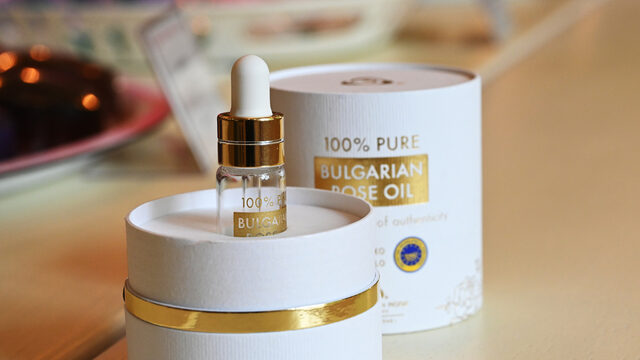A future EU directive on the Registration, Evaluation, Authorisation and Restriction of Chemicals has raised concerns in the essential oils sector. In Bulgaria, these fears evolved into a conspiracy theory, propagated by anti-EU politicians, that "the Commission wants to ban the Bulgarian rose". The reality is, naturally, much more nuanced and there is no immediate danger to the symbolic Bulgarian product.
Panic in the essential oils sector ensued after the announced changes in the EU regulation governing the manufacture and import of chemical substances (REACH). Prospective amendments to the regulation, although still not finalized, worry manufacturers at a European-wide level. Here we should point out that we're not talking about proposed bans or restrictions on production, products or business. If there is any direct "danger", it is related to possible new labeling of the essential oils after their administrative definition of chemical products. Concerns center also on potential market repercussions once the new requirements come into force.
Bulgaria's media recently circulated a statement by the mayor of Kazanlak in which she said that the European Commission would ban rose oil. The topic was then seized upon by social networks, sympathizers and activists from the far-right political party Vazrazhdane to further their short-term political goals.
How the amendments in REACH could be problematic
The proposed changes to EU legislation are part of the Green Deal which, according to the Commission, aims to better protect consumers. However, Brussels could be overreaching itself with this contentious amendment. The final version of the regulation is expected at the end of 2023. In the interim, local authorities, MEPs and lobby organizations in the Belgian capital have rolled up their sleeves to protect the interests of this traditional production, which affects not only Bulgaria, but also Italy, Spain and France.
"According to the expected proposal, essential oils, instead of being considered, as before, as 'substances', will now be categorized as 'mixtures,'" Bulgarian MEP Atige Aliyeva-Veli told journalists earlier this week. She cites this as a threat not only to Bulgaria's emblematic rose oil, but also to lavender and other bigger, and industrially more important, products. Aliyeva-Veli claims the new legislation could rebrand these as "dangerous" because they allegedly contain some ingredients that could harm the body under certain conditions.
Essential oils, although indirectly mentioned in the legislation, contain at least 600 molecules, and if among them even one is suspected of causing possible harm to health, they will become subject to this new regulation as "finished products placed on the market" , but also as part of the composition of cosmetic products. For example, benzyl salicylate is suspected of causing an allergy, geraniol (in geranium oil) and thymol (in thyme oil) may cause potential endocrine, reproductive or other problems (but this has not been scientifically confirmed).
The proposal does not foresee any ban on their production or imposition of a change in their composition. But essential oil packages may carry warning pictograms about harmful ingredients.
The industry, both in Bulgaria and abroad, remains concerned and believes that the regulation is flawed. Gergana Andreeva, executive director of the Bulgarian Association "Essential Oils, Perfumery and Cosmetics" says that "Essential oils should be considered as substances and not as compounds or mixtures, as proposed by the European Commission. So specific molecules in their composition, which could have carcinogenic, reproductive or other side effects, should not be considered separately and accordingly no additional requirements must be applied to them (testing, labeling, etc.)."
Business fears
The direct effects of the introduction of the new measures would be mainly administrative, related to new labeling and related costs. Varieties of lavender, for example, have varying molecular structures that would require different labels. "The proposal requires large investments for farmers and businesses. This means that small producers, such as the majority of rose growers, will experience great difficulties in coping," Ms Aliyeva-Veli believes.
While the potential financial impact of new labels sounds rather exaggerated, the real threat for the manufacturers is actually being pushed out of the cosmetic, herbal and drug markets. "Nobody is going to buy a perfume that says 'This product is dangerous' or one that has a skull on it," says Alain Obanel.
Bulgarian MEP Andrey Novakov says the project is at an early stage to "sound the alarm", but a qualitative impact assessment is needed. According to him, putting too much regulatory burden on producers could make them uncompetitive against imports from Asia, for example.

Businesses also fear that legislators are biased and tend to falsely brand a natural product because of a possible (undefined) risk of one of its many components. "If we want to specify in the infinitesimal way everything that could theoretically be dangerous to humans, it is possible, but useless. We are less demanding when it comes to bleach," says Xavier Lepldur, a producer of bio essential oils from France. "Regulating the formulations of perfumes and cosmetic products is not in the interest of consumers, who are increasingly looking for something natural. And the restriction and limitation of natural ingredients means only one thing - replacing them with synthetic analogues, which are in no way safer," he says.
Preventive action
The Commission reassures that nothing has been set in stone yet and whatever happens, no regulations will enter into force before 2025. Manufacturers, however, prefer to act in advance. A petition in France has already topped 200,000 signatures. Separately, the Association of Mayors of European Cities, in whose regions essential oils are produced, is preparing a meeting in Kazanlak on May 24 and 25, at which their disagreement with the possible changes will be clearly stated. "We must warn about the economic effect of the ban on essential oils in the health care, food and perfume industry. We are also talking about the culture of the whole of Europe," says Kazanlak mayor Galina Stoyanova.
After the Commission publishes the draft regulation, it is referred to the European Parliament and the Council, who prepare their positions before sitting around the negotiating table. "One thing is certain - any project that coincides with the period before and after the European Parliament elections is at risk," Mr Novakov says, adding that Bulgarian MEPs, unlike the behavior of politicians within the country, will oppose measures that harm the Bulgarian national interest.
A future EU directive on the Registration, Evaluation, Authorisation and Restriction of Chemicals has raised concerns in the essential oils sector. In Bulgaria, these fears evolved into a conspiracy theory, propagated by anti-EU politicians, that "the Commission wants to ban the Bulgarian rose". The reality is, naturally, much more nuanced and there is no immediate danger to the symbolic Bulgarian product.
Panic in the essential oils sector ensued after the announced changes in the EU regulation governing the manufacture and import of chemical substances (REACH). Prospective amendments to the regulation, although still not finalized, worry manufacturers at a European-wide level. Here we should point out that we're not talking about proposed bans or restrictions on production, products or business. If there is any direct "danger", it is related to possible new labeling of the essential oils after their administrative definition of chemical products. Concerns center also on potential market repercussions once the new requirements come into force.












